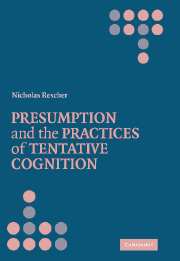Book contents
- Frontmatter
- Contents
- Preface
- Presumption and the Practices of Tentative Cognition
- 1 The Legal Roots Of Presumption
- 2 Presumption and Burden of Proof
- 3 Cognitive Presumption and Truth
- 4 Validating Cognitive Presumptions
- 5 Presumption and Inquiry
- 6 Default Reasoning
- 7 Presumption and Trust
- 8 Presumption and Communication
- 9 Presumption in Science and Beyond
- 10 Specificity Prioritization and the Primacy of the Particular
- 11 Dismissing Extremely Remote Possibilities
- Conclusion
- Bibliography
- Index of Names
Conclusion
Published online by Cambridge University Press: 24 July 2009
- Frontmatter
- Contents
- Preface
- Presumption and the Practices of Tentative Cognition
- 1 The Legal Roots Of Presumption
- 2 Presumption and Burden of Proof
- 3 Cognitive Presumption and Truth
- 4 Validating Cognitive Presumptions
- 5 Presumption and Inquiry
- 6 Default Reasoning
- 7 Presumption and Trust
- 8 Presumption and Communication
- 9 Presumption in Science and Beyond
- 10 Specificity Prioritization and the Primacy of the Particular
- 11 Dismissing Extremely Remote Possibilities
- Conclusion
- Bibliography
- Index of Names
Summary
Most philosophical theorists of knowledge – the classical rationalists (like Descartes and Spinoza) and empiricists (like Hume) as well as various later thinkers from Brentano to our contemporaries – have been concerned primarily with knowledge in the sense of what we know for certain. In consequence it has transpired that – apart from forays by mathematically oriented theorists such as F. P. Ramsey, J. M. Keynes, and R. Carnap into the domain of probability – contemporary epistemology has almost wholly neglected the range of conceptions in the region of uncertainty, the gray area of concepts that, like presumption and plausibility, have an indecisively tentative impetus toward truth.
The quest for certainty has continued to exercise a virtually hypnotic fascination on contemporary theorists of knowledge, who have, accordingly, tended to neglect cognitive claims that stop short of pretentions to definitive finality. But by rights epistemology should surely be seen as having a far broader range, concerned not just with knowledge as such but with a great variety of cognitive matters such as belief, conjecture, supposition, and much else. And it is just here – in the theory of cognition at large – that the concept of presumption comes into its own and provides a healthy antidote to the fundamentalist epistemologies whose inadequacy to provide an adequate theoretical basis for rational inquiry has become increasingly evident in recent years.
- Type
- Chapter
- Information
- Presumption and the Practices of Tentative Cognition , pp. 166 - 170Publisher: Cambridge University PressPrint publication year: 2006



